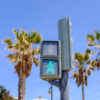When we arrived at Incheon International Airport in Seoul, we bought our metro card at a vending machine. It was a fun experience, receiving a mystery box that contained a card with two adorable Kakao Friends characters on it—our first window into Korea’s culture of cuteness.

We boarded the subway and took a moment to appreciate the peacefulness of the experience: calm and orderly lines, clean floors and bright lighting, a sense of silence as soon as the doors closed. As we were about to take a seat, our eyes were drawn to a bright pink chair, with bright pink signs on both the wall and floor claiming it as a space for pregnant women.
Sure, we’ve seen priority seats before, reserved for the handicapped and elderly. But what struck us was the fact that there was a stuffed animal on that seat. It looked like a bright blue fetus, physically attached by an umbilical cord. If my description makes this sight sound unpleasant, let me reiterate that we were in Korea. It was, of course, adorable.

What surprised me more was that people seemed to respect this seat. While priority seats in the United States seem to always be taken by able-bodied, young people, this time was different: nobody would push aside a placenta just to rest for a few moments. It’s a classic example of nudge theory, changing peoples’ behavior by making a slight adjustment in the environment.
Korea has the lowest fertility rate in the world, so the country has made significant efforts to support pregnant women. What better place to start than public transportation, where pregnant women all over the world usually face discomfort and challenges? (For more context, see this Twitter thread).
The solution doesn’t just stop at stuffed animals. Here are three other ways that Korea supports pregnant women riding public transportation:
A badge: Although people are likely to give up their seat to a visibly pregnant woman, many won’t even budge for those who don’t have a clear bump. Some women are even accused of “faking” their pregnancy so they can take a seat. So, doctors in Korea provide a “pregnant women first” badge, which women can wear on their clothing or purse. (Similarly, Transport for London in the UK offers a “baby on board” badge for pregnant women).
A pink light campaign: In Busan, the government installed a subway bluetooth alert system. Here’s how it works: women carry a sensor, which sends a wireless signal to a beacon when they board the subway. This signal activates a glowing pink light in the priority seat section, so people know to clear the way. (Similarly, pregnant women in Japan can request a seat with their phones through the messaging app Line).
A public holiday: Every year, on October 10, Seoul’s Metropolitan Rapid Transit Corporation celebrates “pregnant women’s day.” Throughout the day, they give out promotional materials and gifts to increase visibility and bring attention to the cause.


